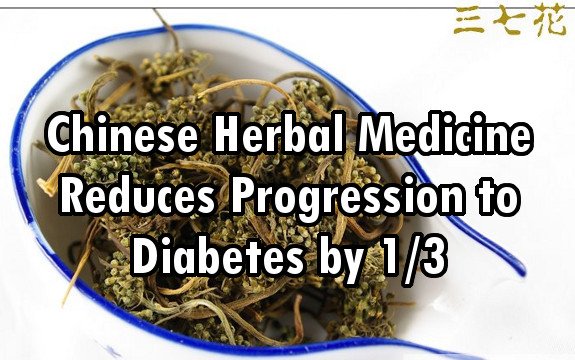Chinese Herbal Medicine Reduces Progression to Diabetes by 1/3

 Approximately 37 million people worldwide currently suffer from diabetes, and many millions have prediabetic syndrome without even realizing it. But an herbal remedy can come to the rescue yet again. According to a study published in the Endocrine Society’s Journal of Clinical Endocrinology & Metabolism (JCEM), traditional Chinese herbal medicine holds promise for slowing the progression of prediabetes to a full-blown diabetes diagnosis.
Approximately 37 million people worldwide currently suffer from diabetes, and many millions have prediabetic syndrome without even realizing it. But an herbal remedy can come to the rescue yet again. According to a study published in the Endocrine Society’s Journal of Clinical Endocrinology & Metabolism (JCEM), traditional Chinese herbal medicine holds promise for slowing the progression of prediabetes to a full-blown diabetes diagnosis.
Prediabetes is diagnosed when someone has elevated blood sugar levels, but glucose is not so high that it necessitates a Type 2 diabetes diagnosis. People with prediabetes do have a higher risk of developing diabetes; however, unless proactive steps are taken to change the lifestyle to mitigate the likely outcome.
Due to the epidemic of obesity in the US, South America and around the world, diabetes is on the rise. One of the authors of the study, Chun-Su Yuan, MD, PhD from the University of Chicago states:
“With diabetes evolving into a serious public health burden worldwide, it is crucial to take steps to stem the flood of cases. Patients often struggle to make the necessary lifestyle changes to control blood sugar levels, and current medications have limitations and can have adverse gastrointestinal side effects. Traditional Chinese herbs may offer a new option for managing blood sugar levels, either alone or in combination with other treatments.”
Utilizing a double-blind, randomized, placebo-controlled trial, almost 400 participants at 11 different research sites were randomly assigned two options: take a capsule containing 10 Chinese herbs, called Tianqi, or a placebo. The participants took the herbs for an entire year.
“It’s a more holistic approach, using medicine to change the overall body function instead of very specifically on symptoms and organs [like Western medicine],” says Yuan.
Read: Turmeric and Diabetes – The Spice for Diabetes Control
Tianqi is a mixture containing Astragali Radix and Coptidis Rhizoma, along with other herbs, which have been previously shown to improve glucose levels.
All participants in the study received a month of lifestyle education at the beginning of the trial and met with nutritionists several times during the course of study. Subjects’ glucose tolerance was measured on a quarterly basis.
By the end of the year, 36 in the Tianqi group developed diabetes, while 56 in the placebo group did. The Tianqi group developed diabetes 32.1% less often than the participants who did not take the herbs but a placebo instead. This compares with the results of pharmaceutical drugs often used to treat pre-diabetic patients, like acarbose and metformin, and none if any side effects were reported from utilizing the herbs.
One of the study’s lead authors, Xiaolin Tong, MD, PhD, of Guang’anmen Hospital in Beijing, China, said:
“Few controlled clinical trials have examined traditional Chinese medicine’s impact on diabetes, and the findings from our study showed this approach can be very useful in slowing the disease’s progression. More research is needed to evaluate the role Chinese herbal medicine can play in preventing and controlling diabetes.”
